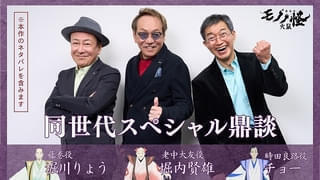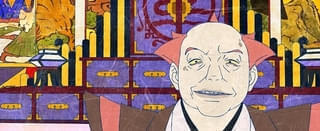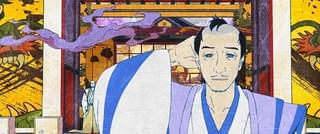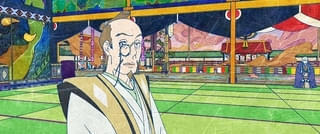“Mononoke the Movie: Fire Rat” A three-way discussion between Kenyu Horiuchi, Cho, and Ryo Horikawa has arrived, discussing the appeal of the work

A special talk between three actors of the same generation has arrived
(C) Twin Engine
A special talk between Horiuchi Kenyuu, Cho, and Horikawa Ryo, who play male characters in the currently-showing animated film “Mononoke: The Movie Chapter 2: Fire Rat,” has arrived.
Horiuchi plays Otomo, the elder statesman who holds real power in the shogunate and is Botan’s father; Cho plays Tokita Yoshimichi, a former townsman who became a samurai after his daughter Fuki was favored by the emperor; and Horikawa plays Fujimaki, an elder statesman who coordinates between the shogunate and the Ooku. The three actors, who are of the same generation, talk lively, and talk extensively about the appeal of the work and their thoughts as actors, such as “I didn’t want to make him just a villain” (Horiuchi), “You should be the commentator for this work” (Cho), and “All you can do is believe in yourself and keep doing it” (Horikawa).
The official interviews with the three actors are as follows. As they touch on the content of the work in depth, we recommend reading it after watching the film.

Elder Otomo (CV: Kenyu Horiuchi)
(C) Twin Engine
–This is your first time appearing in the “Mononoke” series. How did you feel about the work and the roles you played?
Horikawa: When our generation thinks of “ghosts,” we think of works like “The Great Yokai War” and “Tokaido Obake Dochu,” but “Mononoke” is colorful and stylish. It’s also cool how the sliding doors open and close when the scene changes. This is also a period drama, but in period dramas, the dialogue and behavior are important, so I thought it was fun to act again after a long time.
Horiuchi: Ryo has been doing period dramas since he was a child actor. If you count from that point, he’s a veteran.
Horikawa: That’s why I changed the phrasing this time to be more like a period drama.
Cho: Oh, that’s how it was!?
Horiuchi: With these three, the dubbing was recorded in the order of Ryo, me, and Cho. When I was doing my voice recording, I listened to Ryo’s acting, and I was surprised because the script and the lines were slightly different.
Horikawa: For example, it is impossible for the elders to call the Empress, who is the wife of the Emperor, “Empress” or “Odai”. If they did that, they would have to commit seppuku (laughs). So I changed it to “Empress” and “Odai”. Fujimaki, who I played, is one of several elders. If Otomo is the chief elder, he is about the next one. In the story, he is a person who is at the mercy of fate. While wandering around not knowing what is going on, he finally gets the upper hand. But I also felt that he will be crushed again in the end.
Cho: When I heard the title “Mononoke”, I thought it was a monster story like “Gegege no Kitaro”, but when I read the script, I thought “Oh, it’s a period drama”. The character I played, Tokita Yoshimichi, is not a villain. When I went to the set, sound director Yukio Nagasaki told me, “He’s a really normal father,” so I played the role of a very normal father. When I recorded, I was able to hear Ryo and Kenyu’s voices, so I was thinking, “Wow! Amazing!” as I dubbed the role (laughs). Horiuchi: I had seen the TV series of “Mononoke,” so I was surprised when I received the offer to play the movie version. I read the script wondering who would be the Mononoke this time. The elder Otomo I play is the person who controls the Ooku. Moreover, he manipulates those around him without saying what he thinks. His cunning is to respect the customs and ensure that the Ooku functions properly. Since he does what he thinks is righteous, I thought it would be better not to make him seem like a villain, so I tried to play him with a slightly comical nuance. He appears at the beginning, so it would not be interesting if the viewer suddenly thought, “This person is the embodiment of evil.” I aimed for something somewhere between evil and humor. Cho: No no, no matter how you look at it, Otomo was evil! (Laughs) And I kind of wondered if Fujimaki was a bad person too.
Horiuchi: Me too, me too. I thought Fujimaki might be bad.
Horikawa: I’m not a bad person! I was just at the mercy of fate, wandering here and there.
Cho: Compared to those two, I’m just a timid old man (Laughs)

Tokita Yoshimichi (CV: Cho)
(C) Twin Engine
–As you say, the Ooku is a place where the way you see it changes depending on the position of the person, but what did you think of the story of this film?
Horikawa: It’s a story of hereditary struggle that is common in period dramas, where the child born to a concubine becomes the next emperor because there is no son between the official wife and the concubine, but I felt that it had a different charm when expressed with the unique pictures and atmosphere of “Mononoke the Movie”. Compared to the live-action version, it looks very fantasy. I thought it was a fascinating story of Ooku that didn’t feel scary.
Horiuchi: Each character has their own intentions, and when you unravel the thoughts of each person, you can understand it a little. If you can’t maintain your current life without making allowances, then it’s only natural to make allowances. On the other hand, as someone who grew up watching “Yotsuya Kaidan” and other works, I felt that if a period drama is done with this touch, it would become a new kind of ghost story, and that it was a horror.
Cho: I didn’t understand it the first time, so I watched it three times in total. At first, it was over before I knew it. The second half had a great tempo, and the primary colors came one after another, so my eyes were watering (laughs).
Horiuchi: Well, I’m an old man (laughs).
Cho: The sound is also really interesting. The women’s screams are layered with Japanese instruments, and the use of sound is really good. I was at the mercy of it, and after watching it, I was stunned and asked “What was that?”. Of course I understand the story. But I couldn’t understand the details just by watching it once, and I understood some things after watching it two or three times. In the opening scene, it’s not Otomo and Fujimaki who are playing shogi…
Horiuchi: It’s Utayama who is playing against Otomo there.
Cho: That’s right. He’s playing with Utayama, and Otomo says, “You’re checkmate.”
Horiuchi: Right. He’s saying to Utayama, “You’re finished.” I watched it three times too, so I get it (laughs).
Cho: The first time, I thought Otomo would win, but after watching it three times I got confused (laughs).
Horiuchi: The more I watch it, the more I notice the little details.
Cho: This is an original work with no original source. I was amazed at what was going on in the head of director Nakamura Kenji.

Fujimaki (CV: Ryo Horikawa)
(C) Twin Engine
–Did you get a sense of the character you played?
Horikawa: Fujimaki is someone who does as he’s told by those in power. If they tell him to do something like this, he just replies, “Yes, that’s right.” He’s always been like that from the beginning, but at the end I thought, “Huh? He’s changed.” He has the power to appoint, and is no longer close to power, but is now at the center of power. The process is not depicted, so we don’t know the details, but according to the conventional wisdom of period dramas, Fujimaki may eventually be crushed as well.
Horiuchi: But that means he has great skills, doesn’t it?
Horikawa: I guess it’s like Ryo Horikawa in real life. He looks at the other person’s face and runs around in confusion, saying, “Yes!” (laughs). It was like seeing myself.
Cho: I also think Fujimaki is amazing. Even while considering what others think, he chooses the best path for himself and what he should do now. I think he’s an amazing bureaucrat with solid know-how. Tokita is really an ordinary person. It was only because his daughter Fuki was favored by the emperor that his family rose to prominence. He is still confused about his current position. He is only playing shogi with Otomo because he is told to.
Horiuchi: Otomo is cunning. He can act on his own, but he doesn’t. He doesn’t tell people to kill him, but just makes them act on their own. But deep in his heart, he feels that he must protect the history of the Ooku. There are people in every world who feel that way. At the end, when Otomo dies, his true feelings of weakness are revealed. I understand his feelings of “I would do the same,” and I think that if I were in Otomo’s position, I would have done the same. That’s why I didn’t want to make him just a villain.
Cho: There is a third chapter of the “Mononoke the Movie” too. I wonder if Fujimaki and Yoshiji will appear again.
Horiuchi: Well, Otomo is dead after all. If he appears again, he’ll be a Mononoke (laughs).
Cho: At first, I thought Otomo was a Mononoke. His face made me think he was possessed by something.
Horiuchi: The female cast is also good in this work. I always end up crying whenever O-Suzu (Saijo Suzu) appears. I felt her sadness, regret, and all sorts of emotions. Her face and voice when she couldn’t forgive was also good. I especially felt her emotions in the scene where she overlaps with Ofuki, and cried.
Cho: I thought O-Suzu couldn’t forgive Otomo, but it turns out she can’t forgive herself. That’s right, that’s what it was.
Horiuchi: There was a shot where only Ofuki’s mouth was moving, and I wondered what she was saying, but when I saw the finished work, I realized that’s what it was. It’s an amazing work until the end.
–The performances by the talented cast members are also a highlight. Please tell us about a moment when you feel that your work is rewarding.
Horikawa: For me, the best thing is when people who have seen my work say, “It was good.” There aren’t many difficult things in my work, but even if there are times when I think, “Give me a break,” if someone says, “That was good,” at the end, I think it’s simple, but I’ll continue. I think the only thing I can do is believe in myself and keep doing it. You never know until the end what kind of evaluation you’ll get, so there’s no point in expecting that. Don’t run away when it’s over, but take responsibility with dignity. Since it’s something that actors and people from various departments work together to create, we all have different starting points, but we all share the same desire to make something good, and I want to keep that in mind.
Horiuchi: I think that movies belong to the director, but when someone says, “I’m counting on you to play this role,” I still feel scared. Even if I try to do it in my own way, there are many times when I’m told, “It’s completely different.” When I hear that, I try using a different drawer next time. And when I get the OK, it’s really nice. I’ve been doing it for quite a long time, but I feel like I’ve opened up a few more drawers. Just because I have experience doesn’t mean I’m good at it, and I’m getting a bit fuzzy, but I hope that what I put out has a good flavor. When I was younger, if I brought something that I thought was good and it was rejected, I couldn’t come up with an alternative. I’ve come to realize that if I approach it with a margin of freedom, like playing with a steering wheel, I can do it somehow. In the past, I wasn’t confident in my lines, so I just gave them out vaguely. But since I realized that I couldn’t convince people that way, I try to do them with confidence. I can say this because I’ve gained experience. Cho: I think the same as Ryo and Kenyu. I’m very self-centered, so I end up doing things the way I want to. I think of other patterns, but often I can’t change it right away on the spot. But in the end, as Ryo said, the best thing that makes me feel glad I did it is when other people say, “It was good.” When you’re acting, you can only rely on yourself, and even if the director says it’s OK, you still don’t have confidence. When it becomes a work and a third party sees it and says, “That work was good,” I’ll feel glad that I participated. I rely on the audience and the director.
──Thank you for sharing this wonderful story. Finally, please give a message to those who are thinking of seeing this film in the future, and those who have seen it once but are thinking of going again.
Horikawa: I think it’s better to watch it twice than once, and three or five times than twice. That’s because, as I was saying, there are many parts that you won’t notice the first or second time. If I like a movie, I’ll watch it two or three times. It’s also fun to make new discoveries when you watch it again on TV or something a few years later. New discoveries are always interesting, so I would be happy if you could watch this movie five or ten times.
Cho: I hope you will be the commentator of this film! Find something that you can talk about and say, “I think this is what’s good about this film.” I would be happy if you could watch it that many times.
Horiuchi: I think it will be a great shock the first time you see it. You’ll wonder if such images exist, and if you watch it several times, you’ll notice the depth of the images even more. When I saw the finished product, I thought that all the actors were amazing. Each one of them played out their character’s thoughts very well. It’s a great work overall, including the music. You have to see it (laughs).



Comment